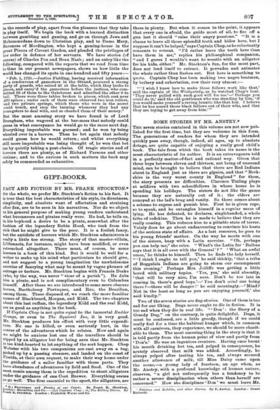GIFT-BOOKS.
FACT AND FICTION BY MR. FRANK STOCKTON.* Ox the whole, we prefer Mr. Stockton's fiction to his fact. It is true that the best characteristics of his style, its directness, simplicity, and absolute want of affectation and straining after fun, are to be seen in his narratives. Nor do we object to his general purpose of making young readers understand what buccaneers and pirates really were. He had, he tells us, in his boyhood a desire to be a pirate, somewhat after the fashion of the legendary Robin Hood, who took from the rich that be might give to the poor. It is a foolish fancy, but the antidote of horrors which Mr. Stockton administers is really a little too strong. The story of that master-villain, L'Olonnois, for instance, might have been modified, or even retrenched altogether. There must, of course, be some horrors in a book of this kind. But it would be well for a writer to make up his mind what particulars he should give, and not suggest to a young imagination the unwholesome exercise of fancying what may be meant by vague phrases of outrage or torture. Mr. Stockton begins with Francis Drake (who, by the way, was never " vicar of a parish "). He dubs him a pirate, and is not complimentary even to Columbus himself. After these we are introduced to some more obscure heroes, Bartholemy Portuquez, and Roc, the Brazilian, among them. These disposed of, we reach the more familiar names of Blackbeard, Morgan, and Kidd. The two chapters about this last ruffian, the legendary Kidd and the real Kidd, are as good as anything in the book.
If Captain Chap is not quite equal to the immortal Rudder Grange, or even to The Squirrel Inn, it is very good. Mr. Stockton produces his effect with very little expendi- ture. No one is killed, or even seriously hurt, in the course of the adventures which he relates. Now and again We might be anxious lest one of the travellers should be nipped by an alligator but for being sure that Mr. Stockton is too kind-hearted to let anything of the sort happen. Chap Webster with his two companions are cast away on a tug, picked up by a passing steamer, and landed on the coast of Florida, at their own request, to make their way home under the guidance of a sailor familiar with those parts. They have abundance of adventures by field and flood. One of the most comic among them is the expedition to shoot alligators Under the guidance of one Coot Brewer. Everything seems to go well. The first essential to the sport, the alligators, are (1.) Buccaneers and Pirates of our Coasts. By Frank B.. Stockton. London : Macmillan and 1110.—(2.) Captain Chap ; nr, The Rolling Stones. By Frauk11. Stockton. London : Frederick Warm and Co.
there in plenty. But when it comes to the point, it appears that every one is afraid, the guide most of all, to fire off a gun lest it should "raise their angry passions." "It is a shame to leave all those splendid teeth and hides here, but I suppose it can't be helped," says Captain Chap, as he reluctantly consents to retreat. "I'd rather leave the teeth here than
have them in me," replies his philosophical companion, " and I guess I wouldn't want to wrestle with an alligator for his hide, either." Mr. Stockton's fun, for the most part, does not lend itself to extract. It pervades and animates the whole rather than flashes out. But here is something to quote. Captain Chap has been making two negro boatmen, by bribery and exhortation, row their very utmost :- "' I wish I knew how to make those fellows work like that,' said the captain of the Winkywinky, as he watched Chap's boat. ' They never pulled with such good will for me.'—' Perhaps you could do it,' said the old gentleman who was standing by him, if you would make yourself a raving lunatic like that boy. I believe that he has scared those black fellows out of their wits, and that they are trying to get away from him."






















































 Previous page
Previous page